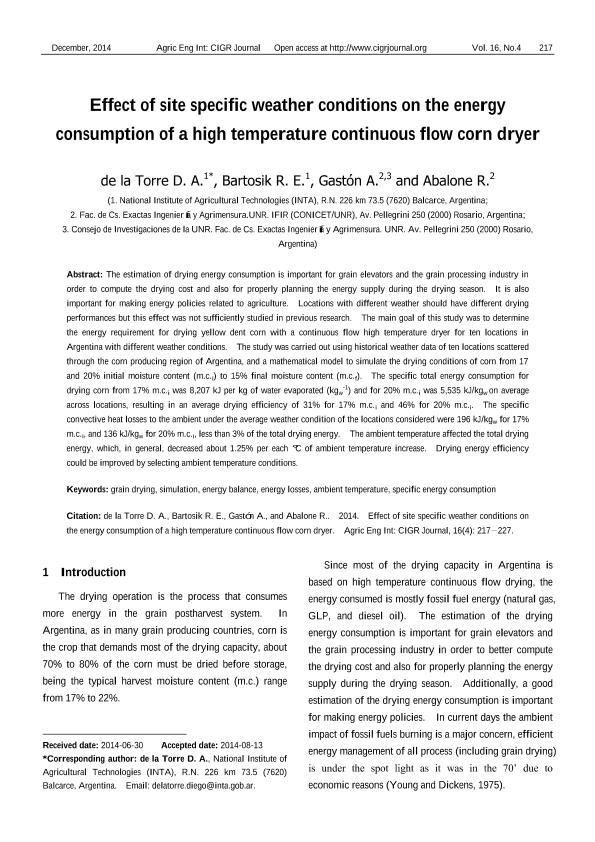Mostrar el registro sencillo del ítem
dc.contributor.author
De la Torre, Diego
dc.contributor.author
Bartosik, Ricardo

dc.contributor.author
Gaston, Analia Graciela Lucia

dc.contributor.author
Abalone, Rita Monica

dc.date.available
2018-02-01T13:32:25Z
dc.date.issued
2014-12
dc.identifier.citation
De la Torre, Diego; Bartosik, Ricardo; Gaston, Analia Graciela Lucia; Abalone, Rita Monica; Effect of Site Specific Weather Conditions on the Energy Consumption of a High Temperature Continuous Flow Corn Dryer; International Commission of Agricultural and Biosystems Engineering; Agricultural Engineering International: CIGR Journal; 16; 4; 12-2014; 217-227
dc.identifier.issn
1682-1130
dc.identifier.uri
http://hdl.handle.net/11336/35350
dc.description.abstract
The estimation of drying energy consumption is important for grain elevators and the grain processing industry in order to compute the drying cost and also for properly planning the energy supply during the drying season. It is also important for making energy policies related to agriculture. Locations with different weather should have different drying performances but this effect was not sufficiently studied in previous research. The main goal of this study was to determine the energy requirement for drying yellow dent corn with a continuous flow high temperature dryer for ten locations in Argentina with different weather conditions. The study was carried out using historical weather data of ten locations scattered through the corn producing region of Argentina, and a mathematical model to simulate the drying conditions of corn from 17 and 20% initial moisture content (m.c.i) to 15% final moisture content (m.c.f). The specific total energy consumption for drying corn from 17% m.c.i was 8207 kJ per kg of water evaporated (kgw-1) and for 20% m.c.i was 5535 kJ kgw-1 on average across locations, resulting in an average drying efficiency of 31% for 17% m.c.i and 46% for 20% m.c.i. The specific convective heat losses to the ambient under the average weather condition of the locations considered were 196 kJ kgw-1 for 17% m.c.i, and 136 kJ kgw-1 for 20% m.c.i, less than 3% of the total drying energy. The ambient temperature affected the total drying energy, which, in general, decreased about 1.25% per each ° C of ambient temperature increase. Drying energy efficiency could be improved by selecting ambient temperature conditions.
dc.format
application/pdf
dc.language.iso
eng
dc.publisher
International Commission of Agricultural and Biosystems Engineering
dc.rights
info:eu-repo/semantics/openAccess
dc.rights.uri
https://creativecommons.org/licenses/by-nc-sa/2.5/ar/
dc.subject
Grain Drying
dc.subject
Simulation
dc.subject
Energy Balance
dc.subject
Energy Losses
dc.subject
Ambient Temperature
dc.subject.classification
Ciencias Medioambientales

dc.subject.classification
Ciencias de la Tierra y relacionadas con el Medio Ambiente

dc.subject.classification
CIENCIAS NATURALES Y EXACTAS

dc.title
Effect of Site Specific Weather Conditions on the Energy Consumption of a High Temperature Continuous Flow Corn Dryer
dc.type
info:eu-repo/semantics/article
dc.type
info:ar-repo/semantics/artículo
dc.type
info:eu-repo/semantics/publishedVersion
dc.date.updated
2018-01-30T19:03:21Z
dc.journal.volume
16
dc.journal.number
4
dc.journal.pagination
217-227
dc.journal.pais
Francia

dc.description.fil
Fil: De la Torre, Diego. Instituto Nacional de Tecnología Agropecuaria. Centro Regional Buenos Aires Sur. Estación Experimental Agropecuaria Balcarce; Argentina
dc.description.fil
Fil: Bartosik, Ricardo. Instituto Nacional de Tecnología Agropecuaria. Centro Regional Buenos Aires Sur. Estación Experimental Agropecuaria Balcarce; Argentina
dc.description.fil
Fil: Gaston, Analia Graciela Lucia. Consejo Nacional de Investigaciones Científicas y Técnicas. Centro Científico Tecnológico Conicet - Rosario. Instituto de Física de Rosario. Universidad Nacional de Rosario. Instituto de Física de Rosario; Argentina
dc.description.fil
Fil: Abalone, Rita Monica. Consejo Nacional de Investigaciones Científicas y Técnicas. Centro Científico Tecnológico Conicet - Rosario. Instituto de Física de Rosario. Universidad Nacional de Rosario. Instituto de Física de Rosario; Argentina
dc.journal.title
Agricultural Engineering International: CIGR Journal
dc.relation.alternativeid
info:eu-repo/semantics/altIdentifier/url/http://www.cigrjournal.org/index.php/Ejounral/article/view/2962
Archivos asociados
